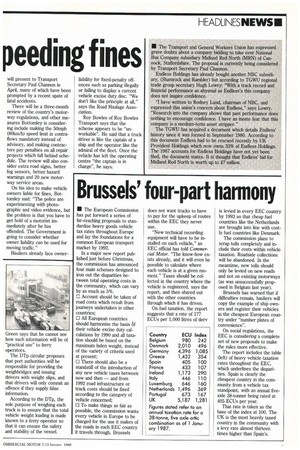Brussels' four-part harmony
Page 7

If you've noticed an error in this article please click here to report it so we can fix it.
• The European Commission has put forward a series of Ear-reaching proposals to standardise heavy goods vehicle tax rates throughout Europe and lay the foundations for a common European transport market by 1992.
In a major new report published just before Christmas, the commission has announced four main schemes designed to iron out the disparities between total operating costs in the community, which can vary by as much as 5%.
0 Account should be taken of road costs which result from journeys undertaken in other countries; 0 All European countries should harmonise the basis cif their vehicle excise duty calculations by 1990 and all taxation should be based on the maximum laden weight, instead of the variety of criteria used at present; 0 There should also be a standstill of the introduction of any new vehicle taxes between now and then — and from 1992 road infrastructure or track costs should be fixed according to the category of vehicle concerned; 0 To make things as fair as possible, the commission wants every vehicle in Europe to be charged for the use it makes of the roads in each EEC country it travels through. Brussels does not want trucks to have to pay for the upkeep of routes within the EEC they never use.
"New technical recording equipment will have to be installed on each vehicle," an EEC official has told Commercial Motor. "The know-how exists already, and it will even be possible to calculate where each vehicle is at a given moment." Taxes should be collected in the country where the vehicle is registered, says the report, and then shared out with the other countries through which it has driven.
On fuel taxation, the report suggests that a rate of 177 ECUs per 1,000 litres of dery is levied in every EEC country by 1993 so that cheap fuel countries like the Netherlands are brought into line with costly fuel countries like Denmark.
The commission plans to scrap tolls completely and include their costs within vehicle taxation. Roadside collections will be abandoned. In the meantime, new tolls should only be levied on new roads and not on existing motorways (as was unsuccessfully proposed in Belgium last year).
Brussels has warned that if difficulties remain, hauliers will copy the example of ship owners and register their vehicles in the cheapest European country under "number plates of convenience".
On social regulations, the EEC is considering a complete set of new proposals to make the rules more effective.
The report includes the table (left) of heavy vehicle taxation rates throughout the EEC, which underlines the disparities. Spain is clearly the cheapest country in the community from a vehicle tax standpoint, with an annual fiveaxle 38-tonner being rated at 405 ECUs per year.
That rate is taken as the base of the index at 100. The UK is the most heavily taxed country in the community with a levy rate almost thirteen times higher than Spain's.
































































